Rabbits are popular pets and are often fed a variety of vegetables as part of their daily diet. Arugula is a leafy green vegetable that is known for its slightly bitter and peppery taste. Many pet owners wonder if it is safe to feed their rabbits arugula every day. In this article, we will explore whether rabbits can eat arugula daily and the potential benefits and risks associated with this.
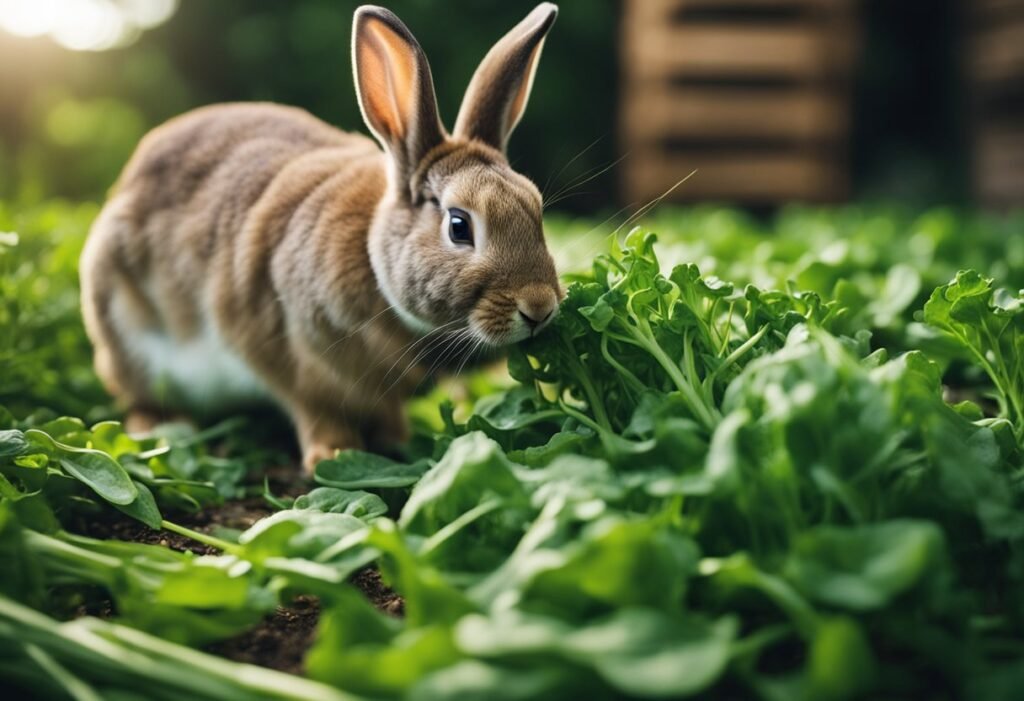
Arugula is a nutrient-dense vegetable that is rich in vitamins and minerals, including vitamin C, vitamin K, folate, and calcium. Rabbits can benefit from a varied diet that includes a range of vegetables, and arugula can be a healthy addition to their diet in moderation. However, it is important to note that rabbits have sensitive digestive systems and too much of any vegetable can cause digestive upset or other health issues.
In the following sections, we will delve deeper into the nutritional value of arugula and the potential risks associated with feeding rabbits arugula every day. We will also provide recommendations for incorporating arugula into your rabbit’s diet safely and effectively.
Table of Contents
Nutritional Benefits of Arugula for Rabbits
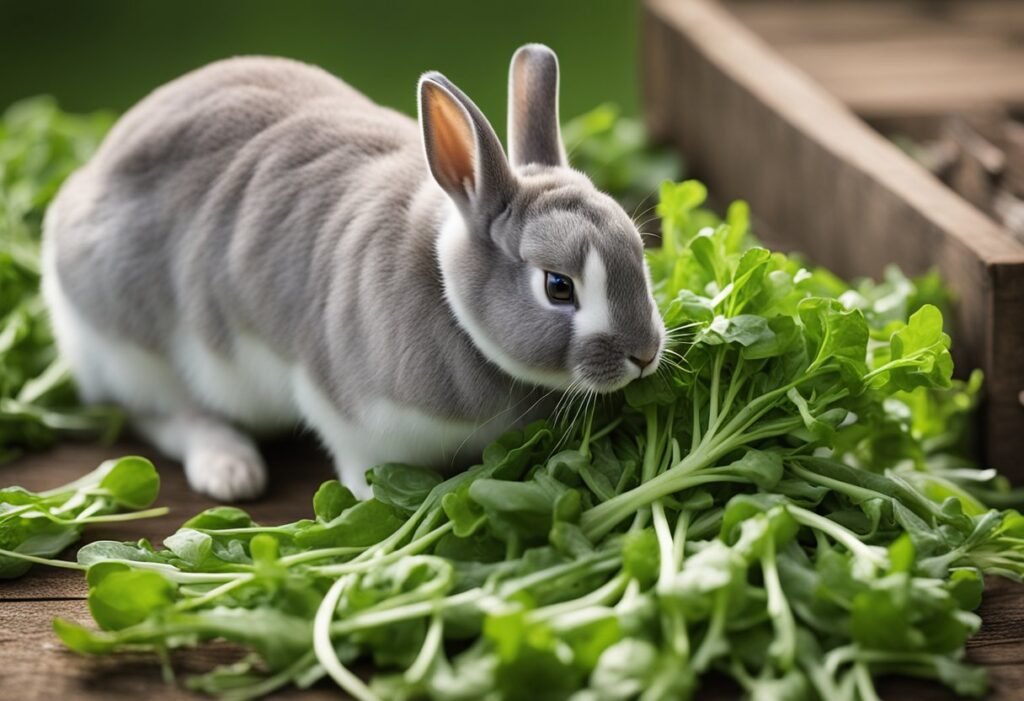
Arugula is a leafy green vegetable that is a great source of nutrition for rabbits. Here are some of the nutritional benefits of arugula for rabbits:
High in Fiber
Arugula is high in fiber, which is important for maintaining healthy digestion in rabbits. Fiber helps keep the digestive system moving and prevents blockages. It also helps rabbits feel full, which can prevent overeating and obesity.
Rich in Vitamins and Minerals
Arugula is rich in vitamins and minerals that are important for rabbit health. It contains vitamin A, which is important for maintaining healthy eyesight, and vitamin K, which is important for blood clotting. It also contains calcium, which is important for maintaining strong bones, and iron, which is important for maintaining healthy blood.
Low in Calories
Arugula is low in calories, which makes it a great choice for rabbits who need to maintain a healthy weight. It can be used as a low-calorie treat or as a supplement to a rabbit’s regular diet.
How Much Arugula Should Rabbits Eat?
While arugula is a nutritious food for rabbits, it should be fed in moderation. Too much arugula can cause digestive upset and diarrhea. We recommend feeding arugula to rabbits in small amounts, no more than a few leaves per day.
In conclusion, arugula is a nutritious food for rabbits that can be included in their diet in moderation. It is high in fiber, vitamins, and minerals, and low in calories. As with any new food, it is important to introduce arugula slowly and in small amounts to prevent digestive upset.
Recommended Frequency of Arugula in a Rabbit’s Diet
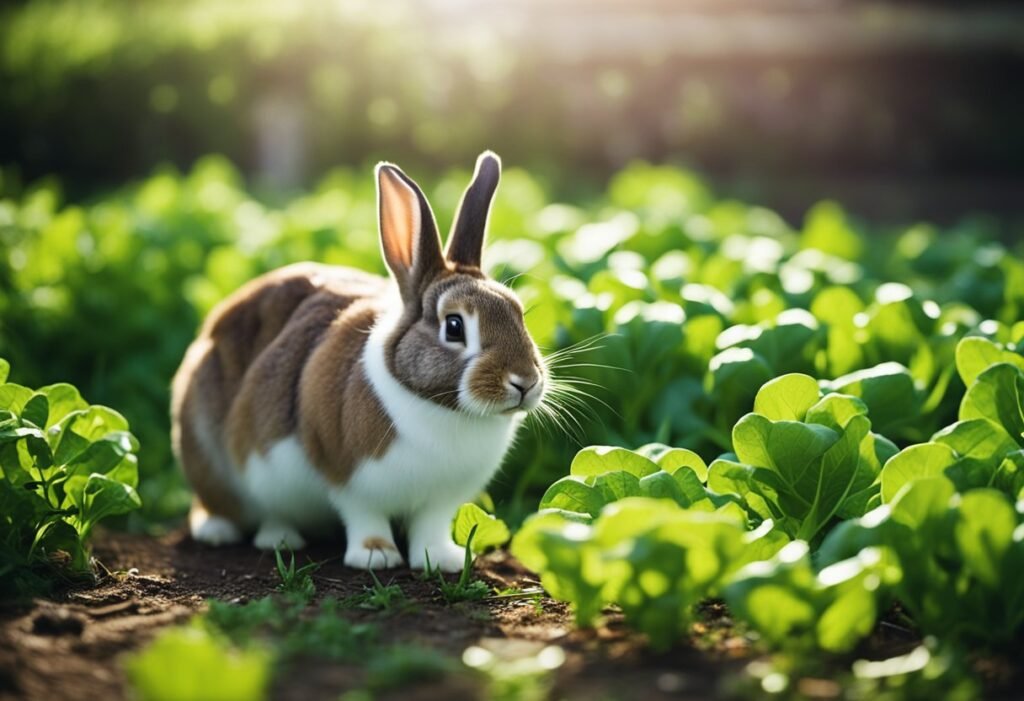
Arugula is a leafy green vegetable that is safe for rabbits to eat. However, it is important to note that arugula should not be the only vegetable in a rabbit’s diet. In fact, it is recommended that arugula only make up a small portion of a rabbit’s overall diet.
We recommend that rabbits be fed a variety of vegetables, including arugula, on a daily basis. However, arugula should only make up about 10% of a rabbit’s daily vegetable intake. This means that a rabbit weighing around 5 pounds should only be given about 1/4 cup of arugula per day.
It is also important to note that arugula should not be given to rabbits every day. While it is safe for rabbits to eat, too much arugula can cause digestive problems. We recommend that rabbits be given arugula no more than 2-3 times per week.
In addition to arugula, rabbits should be given a variety of other vegetables such as kale, spinach, parsley, and cilantro. It is important to provide a balanced diet to ensure that rabbits receive all the necessary nutrients for good health.
Overall, while arugula is safe for rabbits to eat, it should only be given in moderation as part of a balanced diet. By providing a variety of vegetables and limiting the amount of arugula, you can help ensure that your rabbit stays healthy and happy.
Portion Size Considerations for Rabbits Eating Arugula
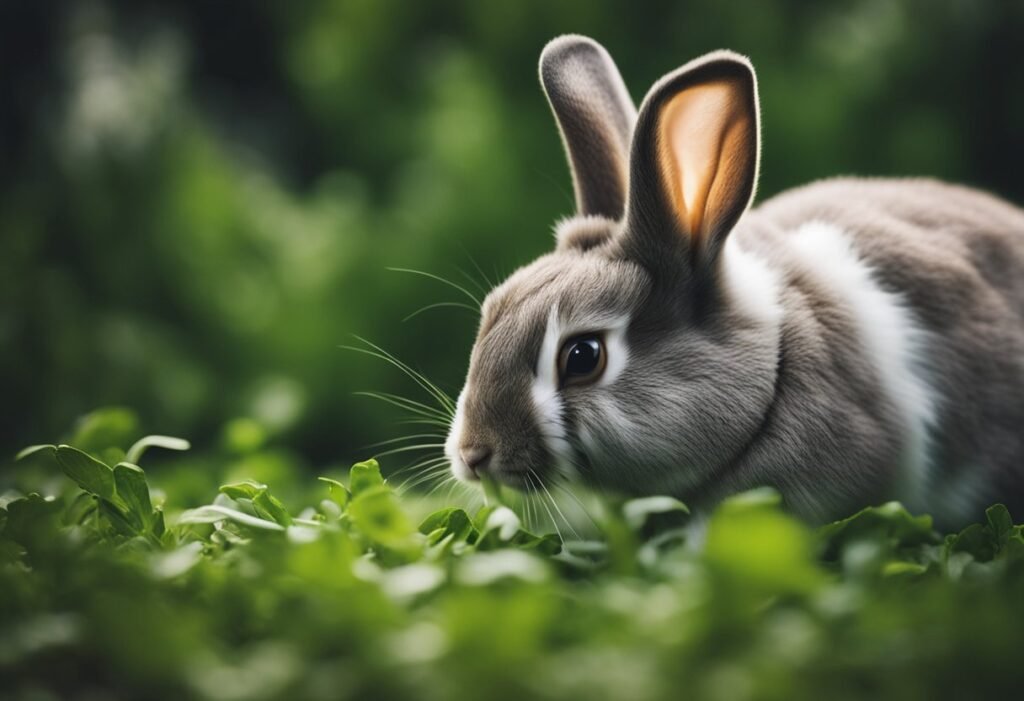
When feeding your rabbit arugula, it is important to consider portion sizes to ensure that your furry friend is getting the right amount of nutrients without overeating. While arugula is a healthy leafy green vegetable that can be included in your rabbit’s diet, it should not be the sole source of their nutrition.
We recommend that rabbits are fed a varied diet that includes hay, fresh vegetables, and fresh fruits. Arugula should be given in moderation and as part of a balanced diet. A good rule of thumb is to offer a handful of arugula per day, along with other vegetables and fruits.
It is important to note that arugula contains high levels of calcium and oxalic acid. While calcium is important for your rabbit’s health, too much of it can lead to health problems such as bladder stones. Oxalic acid can also interfere with calcium absorption, so it is important to balance arugula with other vegetables that are lower in oxalic acid.
In addition to portion size, it is also important to wash arugula thoroughly before feeding it to your rabbit. This will help remove any pesticides or other harmful substances that may be present on the leaves.
Overall, arugula can be a healthy addition to your rabbit’s diet when given in moderation and as part of a balanced diet. By considering portion sizes and balancing arugula with other vegetables, you can help ensure that your rabbit stays healthy and happy.
Risks of Overfeeding Arugula to Rabbits
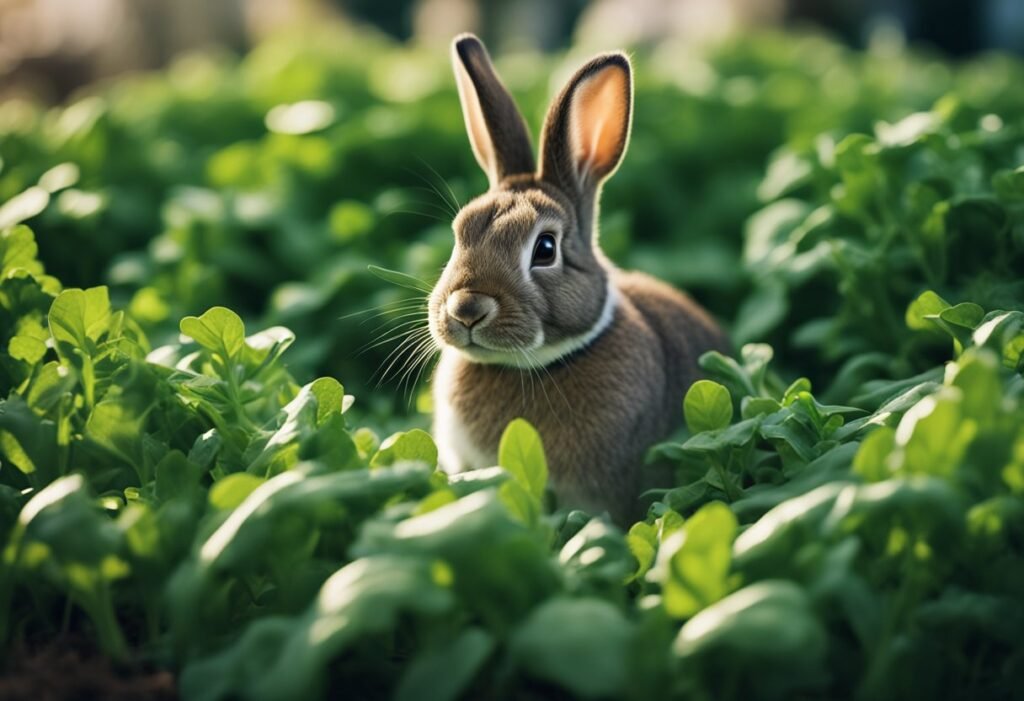
While arugula can be a healthy addition to a rabbit’s diet, overfeeding it can lead to some risks. Here are a few things to keep in mind:
Digestive Issues
Arugula is high in fiber, which can be beneficial for a rabbit’s digestive system. However, too much fiber can cause digestive issues such as diarrhea, bloating, and gas. It’s important to introduce arugula slowly into a rabbit’s diet and monitor their stool to ensure they are not experiencing any digestive discomfort.
Calcium Imbalance
Arugula is also high in calcium, which can be beneficial for a rabbit’s bones and teeth. However, overfeeding arugula can lead to a calcium imbalance, which can cause health issues such as bladder stones. It’s important to ensure that a rabbit’s diet is balanced and includes a variety of vegetables to prevent any imbalances.
Oxalates
Arugula contains oxalates, which can bind to calcium and prevent it from being absorbed by the body. Overfeeding arugula can lead to a buildup of oxalates in the body, which can contribute to the formation of bladder stones. It’s important to feed arugula in moderation and include other vegetables in a rabbit’s diet to prevent any issues.
In conclusion, while arugula can be a healthy addition to a rabbit’s diet, it’s important to feed it in moderation to prevent any health issues. By introducing arugula slowly and monitoring a rabbit’s stool, ensuring a balanced diet, and feeding a variety of vegetables, rabbits can safely enjoy arugula as part of their diet.
Variety in a Rabbit’s Diet

As responsible rabbit owners, we want to ensure that our furry friends are getting a well-balanced diet. While arugula is a great addition to a rabbit’s diet, it is important to offer a variety of foods to ensure they are getting all the necessary nutrients.
In addition to arugula, rabbits can eat a variety of leafy greens such as kale, spinach, and romaine lettuce. It is important to introduce new foods slowly and in small quantities to avoid digestive upset.
We can also offer our rabbits a variety of vegetables such as carrots, bell peppers, and broccoli. Fruits such as apples and bananas can be offered as occasional treats.
It is important to note that while variety is important, we should avoid feeding our rabbits foods that are high in sugar or fat. This includes processed foods, grains, and nuts.
By offering a variety of fresh foods, we can ensure that our rabbits are getting a well-balanced diet and are happy and healthy.
How to Safely Introduce Arugula to a Rabbit’s Diet
When introducing arugula to a rabbit’s diet, it is important to do so gradually and in moderation. This will help to prevent any digestive issues or other health problems that may arise from sudden changes in diet. Here are some tips on how to safely introduce arugula to your rabbit:
- Start with small amounts – Begin by offering your rabbit a small amount of arugula, such as a few leaves, to see how they react. If they show no signs of discomfort or digestive issues, you can gradually increase the amount over time.
- Monitor your rabbit’s behavior – Keep an eye on your rabbit’s behavior after introducing arugula to their diet. If they seem lethargic, have diarrhea, or show any other signs of discomfort, it may be a sign that they are not tolerating the arugula well.
- Offer a variety of vegetables – While arugula can be a healthy addition to a rabbit’s diet, it should not be the only vegetable they eat. Offer a variety of vegetables, such as kale, spinach, and carrots, to ensure that your rabbit is getting a balanced diet.
- Avoid pesticides and herbicides – When feeding your rabbit arugula, make sure to choose organic or pesticide-free varieties. Pesticides and herbicides can be harmful to rabbits and may cause health problems over time.
By following these tips, you can safely introduce arugula to your rabbit’s diet and provide them with a healthy and balanced diet. Remember to always consult with your veterinarian before making any changes to your rabbit’s diet or feeding routine.
Monitoring Your Rabbit’s Health
As responsible rabbit owners, it is important to monitor our furry friends’ health regularly. This includes observing their eating habits and ensuring they are getting a balanced and varied diet.
When feeding arugula to your rabbit daily, it is essential to keep an eye on their digestive system. Rabbits have a sensitive digestive system, and consuming too much arugula can cause digestive issues such as bloating, gas, and diarrhea. We recommend introducing arugula gradually into your rabbit’s diet and monitoring their response.
It is also important to note that arugula is high in calcium, which can lead to bladder and kidney issues in rabbits if consumed in excess. We suggest limiting the amount of arugula you feed your rabbit and ensuring they are getting a variety of other greens and vegetables in their diet.
Regular check-ups with a veterinarian who specializes in rabbits can also help ensure your rabbit’s health is in good condition. They can provide advice on the best diet for your rabbit and identify any potential health issues early on.
By monitoring your rabbit’s health and providing them with a balanced diet, including arugula in moderation, you can help ensure they live a long and healthy life.
Frequently Asked Questions
Is arugula a safe green for daily rabbit diets?
Yes, arugula is a safe green for rabbits to consume on a daily basis. It is low in oxalic acid, which can cause health issues in high quantities, and high in fiber, vitamins, and minerals that are beneficial for rabbits.
How often should rabbits be fed arugula?
Rabbits can be fed arugula daily, but it should be given in moderation as part of a varied diet. A handful of arugula per day is enough for an average-sized rabbit.
What are the health benefits of feeding arugula to rabbits?
Arugula is a good source of vitamins A, C, and K, as well as calcium, iron, and potassium. These nutrients are important for maintaining healthy bones, teeth, and fur, and for supporting the immune system and overall health of rabbits.
Are there any risks associated with feeding rabbits arugula regularly?
While arugula is generally safe for rabbits, feeding too much of it can cause digestive issues such as diarrhea or bloating. It is important to introduce new foods gradually and monitor your rabbit’s health and behavior.
What other greens are recommended for a balanced rabbit diet?
A balanced rabbit diet should include a variety of leafy greens such as kale, parsley, dandelion greens, and romaine lettuce. It is important to avoid feeding rabbits high-oxalate greens such as spinach and beet greens, as well as toxic plants such as rhubarb and avocado.
Can a mix of arugula and other vegetables be a staple in a rabbit’s diet?
While a mix of arugula and other vegetables can be a part of a balanced rabbit diet, it should not be the sole source of nutrition. Rabbits require a diet that is high in fiber and low in fat, with a mix of hay, fresh greens, and a limited amount of pellets.





